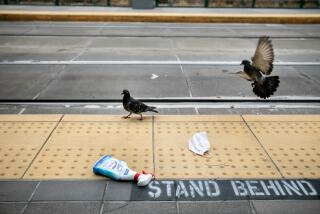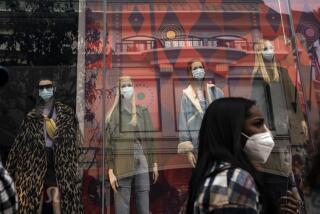Editorial: We need a COVID postmortem so we do better with the next plague
- Share via
The most troubling revelation in “The Premonition,” the recent book by California author Michael Lewis, was that during the first crucial first months of the COVID-19 pandemic no one was really in charge of our nation’s response.
The states were looking to the federal government for leadership, but the government, including the once-venerable Centers for Disease Control and Prevention, had no guidance to provide other than to downplay the threat to the U.S. from the novel coronavirus ravaging Wuhan, China. Instead, Lewis writes, protecting the country fell to a self-appointed “rogue group of patriots who were working behind the scenes.”
Americans love tales about roguish heroes, but this one doesn’t end well. A nation with tremendous wealth and resources was caught unaware and unprepared for the most serious public health threat in more than a century. And though this story is still unfolding as the Delta variant of the virus is driving a new surge of cases and deaths, President Biden and Congress must commit now to conducting an honest and clear-eyed examination of the national response to the pandemic.
Moderate congressional Democrats known as the Blue Dog Coalition sent a letter to leaders in the House and Senate earlier this month urging that they establish an independent, bipartisan national commission on the COVID-19 pandemic response, modeled after the 9/11 commission.
Its goal, which we support, would be a commission led by 10 nongovernmental experts, with Democrats and Republicans splitting the appointments, and supported by professional staff and various experts, that would provide a full accounting of the pandemic response and recommendations for government and industry to prepare for the next plague. It’s similar to a proposal by two U.S. senators earlier this year and what is envisioned by foundations, academics, medical professionals and scientists who are part of a COVID commission planning group. (Again, dedicated behind-the-scenes experts doing the hard foundational work.)
It may seem like an inopportune time for such a request, with congressional leaders still fighting over the composition of a commission to examine the Jan. 6 riot at the U.S. Capitol, but it’s imperative that work begin now before urgency and memories wane.
The commission should be structured so that it doesn’t dwell on who did — or didn’t — do what, or its eventual report will become fodder to feed the culture war rather than the sober and trusted guidebook that we need. This was a crisis without recent historical precedent, and it’s fair to say there is enough blame to spread from one end of the United States to the other.
Mistakes were made, beginning with the failure to take the emerging threat to the nation seriously, and they must be properly identified and assessed. It will be equally important to note the pandemic success stories, as rare as they may be, such as Operation Warp Speed. Throwing billions of dollars of public money at private companies to help speed development of a vaccine was a gamble, but it paid off in a big way.
One of the most important questions for the future commission to ponder is who or what agency is best equipped to take charge in a public health emergency, and how that leadership should manifest itself. All the failures — from the debacle of testing during the early days to the chronic shortages of safety and medical equipment — were caused, at least in part, by a leadership vacuum.
A national postmortem is essential to our future security. But it’s just as important for states to do their own self-examination, as so much of the pandemic response was left to them.
To that end, Gov. Gavin Newsom and the Legislature should commit to establishing and supporting an independent and bipartisan COVID commission that would investigate how the pandemic was handled in California. In many ways, California was a leader among the states, enacting the first stay-at-home order in the nation (a result of urging, Lewis writes, by the same group of rogue medical professionals he lionizes in his book), but it also stumbled at times, notably in data collection and public communication.
Newsom and the Democratic-controlled Legislature may balk at the idea of airing the state government’s dirty laundry in public, lest it provide more ammunition to the governor’s critics. But it’s the right thing to do, nevertheless. Besides, it will take months just to seat a commission and get it up and running, and perhaps a year or more for the commission to complete its examination and produce a comprehensive report. At that point, Newsom, if he survives this year’s recall effort, is likely to have either won reelection or not.
What matters is that more than 610,000 Americans have died, more than 63,000 of them in California, from COVID-19. Had we been better prepared as a nation and a state, some lives — maybe many — might have been spared. We can do better next time a novel virus threatens the nation — but only if we have the collective courage to face our failures first.
More to Read
A cure for the common opinion
Get thought-provoking perspectives with our weekly newsletter.
You may occasionally receive promotional content from the Los Angeles Times.










